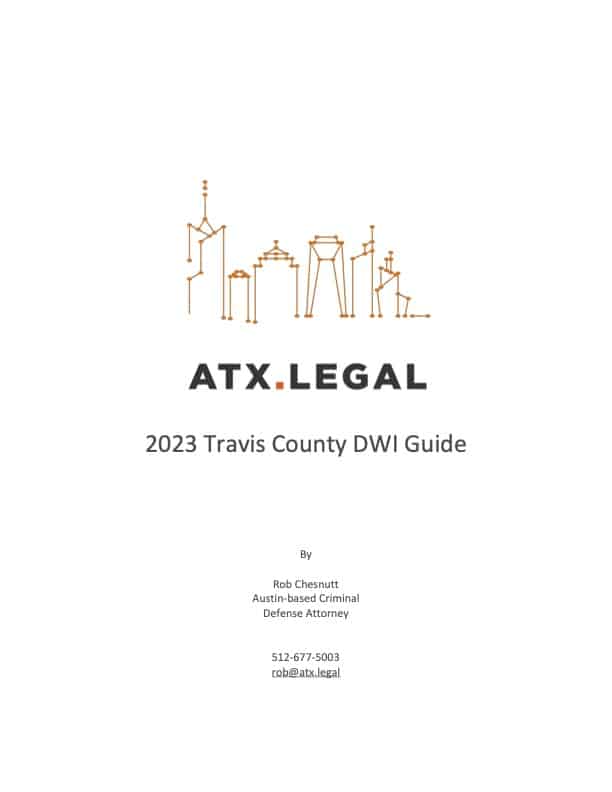2023 Travis County DWI Guide Part 8 - Felony DWIs
For obvious reasons, felony DWIs are more serious than misdemeanors. For starters, jail time is far more likely with DWIs. Additionally, bond conditions are going to be more severe, costs will be higher, and overall the process is going to be more burdensome. This section discusses how felony DWIs differ from misdemeanors, but with these cases, it is especially important that you reach out to an attorney ASAP. As a reminder – as with the other sections in this guide, it is NOT a substitute for legal advice.
What makes a DWI a felony?
The most common reason a DWI is charged as a felony is when there are two previous DWI convictions. Note that I use the word “conviction”. This means that if you were charged with 2 DWIs in the past, but one or both of them did NOT result in a conviction, the new charge is not enhanced to a felony. The flip side of this is that the DWI is “automatically” enhanced to a felony with 2 convictions, even if the facts of the new case are not very severe.
Another way a DWI is enhanced to a felony is if there is a child in the car during the commission of the DWI. Again, the “severity” of the DWI makes no difference here. Even if the driver is not over .08 BAC – if there is a child in the car when he/she is charged with DWI, it is at the felony level.
Intoxication Assault and Intoxication Manslaughter
If your DWI was a collision where someone was seriously injured or died, the charges are obviously even more serious. Intoxication Assault is a 3rd degree felony and intoxication manslaughter is a 2nd degree felony. If you or a loved one are in this situation, it is beyond the scope of this guide, and you should seek a consultation with an attorney immediately. Each case of this nature is very fact-specific, so a general guide for these cases is not possible.
Bond and Conditions
Bond is more difficult for felony DWIs. While I have been able to secure PR bonds in felony DWI cases, it is not a given that a judge will grant one. Often a cash or surety bond will be set. I have seen surety bonds as low as $5,000 for felony DWIs, but they can go much higher. Bond conditions always include an IID, and can also include SCRAM, therapy, or even inpatient care in some cases. Violations of bond conditions (like IID violations), can quickly result in a bond revocation, meaning you would be arrested and could be forced to wait in custody until the case is resolved.
SAFP
Although not exclusively limited to felony cases, SAFP (pronounced “Safe-P”), we usually see it in the context of felony DWIs. SAFP is an in-jail inpatient program that lasts 6-12 months. In addition to that term, the judge can order the defendant to remain in custody while awaiting an open spot in SAFP, which can add months to the time spent in custody. By most accounts, SAFP time is worse than regular time. It is something to be avoided if possible. Unfortunately, when it comes to felony DWIs, it is not always possible to avoid this outcome.
Plea Negotiations for Felony DWIs
Often the plea negotiations in felonies involve avoiding a felony conviction. Sometimes this means accepting a misdemeanor conviction with onerous probation terms. A felony will remain on a person’s criminal history forever. It is not something to be taken lightly. Therefore, making certain concessions in probation to avoid a felony conviction is often the best choice.
As discussed above, another point of contention in felony DWIs involves SAFP. If we can keep a felony off the client’s record and avoid SAFP, often a plea agreement makes sense. Sometimes, to avoid SAFP we may offer the alternative of Intensive Outpatient Care, or a private inpatient facility for 30 days. Taking these steps assures the prosecutor that you are taking the case seriously.
A Note on Mental Health
While almost anyone can make an error in judgment that leads to a misdemeanor DWI, a second and third arrest for DWI is an indication that the drinking may be beyond your control. I often talk to my clients about the benefits of therapy and DWI classes as it relates to their legal case. That is – I’m not really concerned with whether the classes are helping you personally – only that they help the legal case go more smoothly. Sometimes, however, it is clear that my clients truly are struggling with a powerful addiction. Certainly, a felony DWI is an indication of that.
If you’re reading this and you are struggling with addiction, don’t be afraid to ask for help. Others have gone through the same thing. They can help you with their experiences and the lessons they have learned. This can be a trained therapist, a friend, or even a stranger on the internet if that’s what works for you. People can and do conquer alcoholism every day. You can be one of them.

